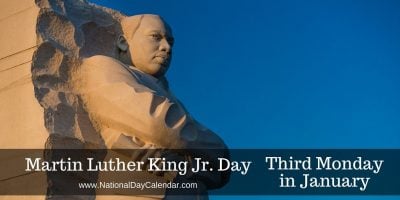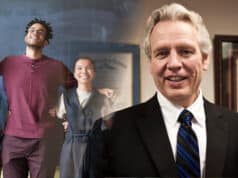
Martin Luther King Jr. Day is on the third Monday in January. Martin Luther King Jr.(January 15, 1929 – April 4, 1968) was an American clergyman, activist and leader in the African-American Civil Rights Movement. He is best known for his role in the advancement of civil rights using nonviolent civil disobedience. King has become a national icon in the history of American progressivism. Hundreds of streets in the U.S. have been renamed in his honor.
A gifted and friendly student, King attended Morehouse College where he earned a BA in sociology. Combining a passion for racial equality with a rediscovered spirituality, King then attended Crozer Theological Seminary following in his father’s and grandfather’s footsteps earning a Bachelors of Divinity.
Shortly after he completed his Ph.D. in theology at Boston University in 1955 a 42-year-old Rosa Parks (See Rosa Parks Day which is observed December 1) refused to give up her seat on a bus in Montgomery, Alabama. The opportunity for the NAACP to bring their civil rights efforts to the forefront was before them, and King was chosen to lead the successful city-wide boycott of the Montgomery transit system.
Just over a year later, King along with over 60 other ministers and activists founded the Souther Christian Leadership Conference. Together they coordinated non-violent protests and gave a voice to the young civil rights movement.
Through the next twelve years, King would be influential in organizing marches, sit-ins and political rallies for civil rights. During a 1963 March on Washington, D.C. for Jobs and Freedom, King spoke before more than 200,000 regarding the challenges African Americans face. His “I Have a Dream” speech has gone down in many history books as one of the greatest speeches ever given. Brutally honest, a call for action and a vision of hope, King’s speech resonated throughout the nation.
In early 1964, during a march outside Selma when 1,500 men and women were met by a wall of state troopers, King lead the marchers in prayer successfully avoiding any confrontation with authorities. On July 2, President Lyndon B. Johnson signed the Civil Rights Act of 1964 outlawing discrimination based on race, color, religion, sex or national origin. That same year, King became the youngest recipient of the Nobel Peace Prize for his unswerving work in the Civil Rights Movement.
In early 1965, Selma, Alabama became the center of the Civil Rights movement when new voting rights legislation was introduced in Congress that would ban literacy tests, mandate federal oversight where tests were administered and would give the U.S. attorney general the duty of challenging the use of poll taxes for state and local elections. Televised violence in February of that year resulted in the death of Jimmie Lee Jackson. King’s presence and President Johnson’s support of the marchers helped bring peace. Throughout the next month, marchers continued between Selma and Montgomery. Congress Passed the Voting Rights Act in August of that year.
Author, speaker, father, theologian, activist, King was assassinated by James Earl Ray on April 4, 1968, in Memphis, Tennesee while giving a speech at a sanitation workers’ strike. President Johnson called for peace in the wave of riots and violence that followed, referring to King as the “apostle of nonviolence.”
HOW TO OBSERVE
Use #MartinLutherKingJrDay to post on social media.
HISTORY
While President Ronald Reagan signed into law in 1983, Martin Luther King, Jr. Day was first observed as a U.S. federal holiday in 1986.












